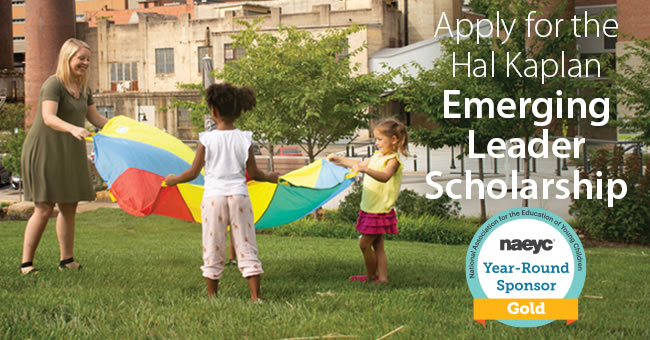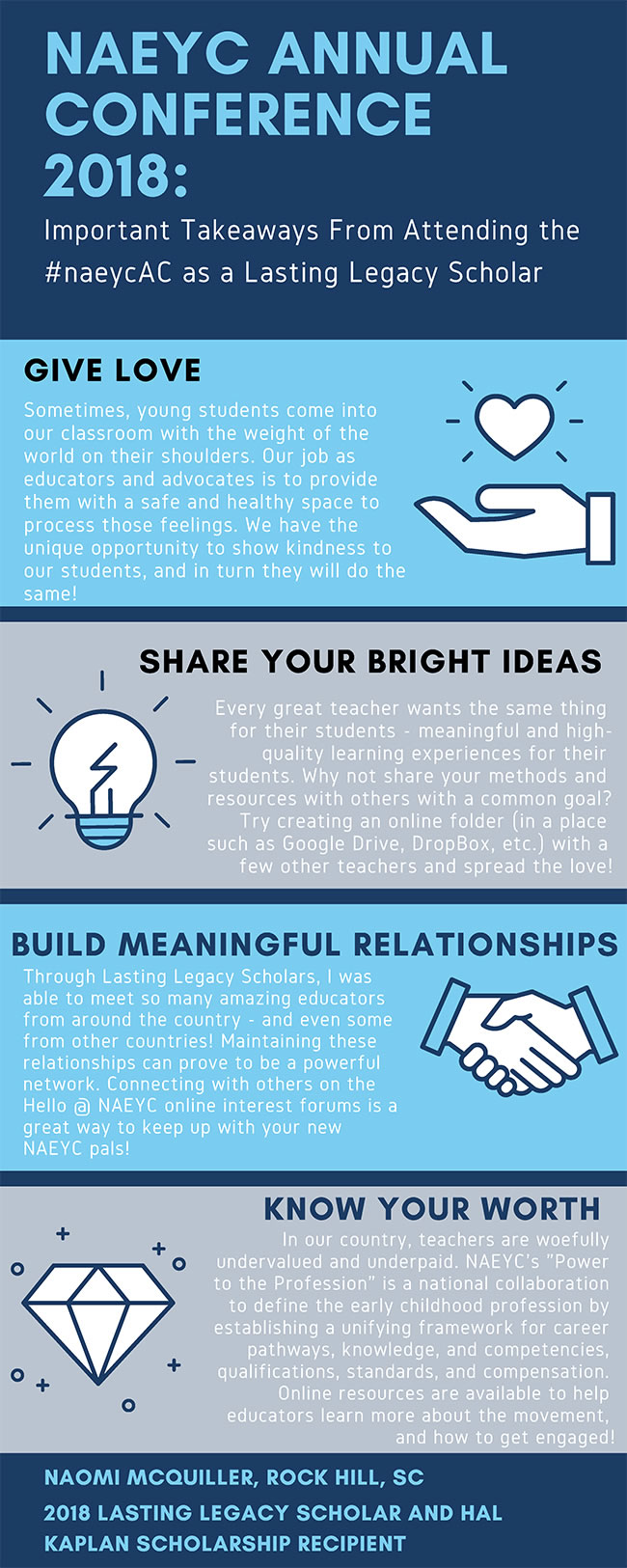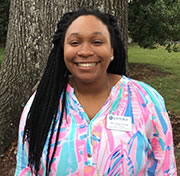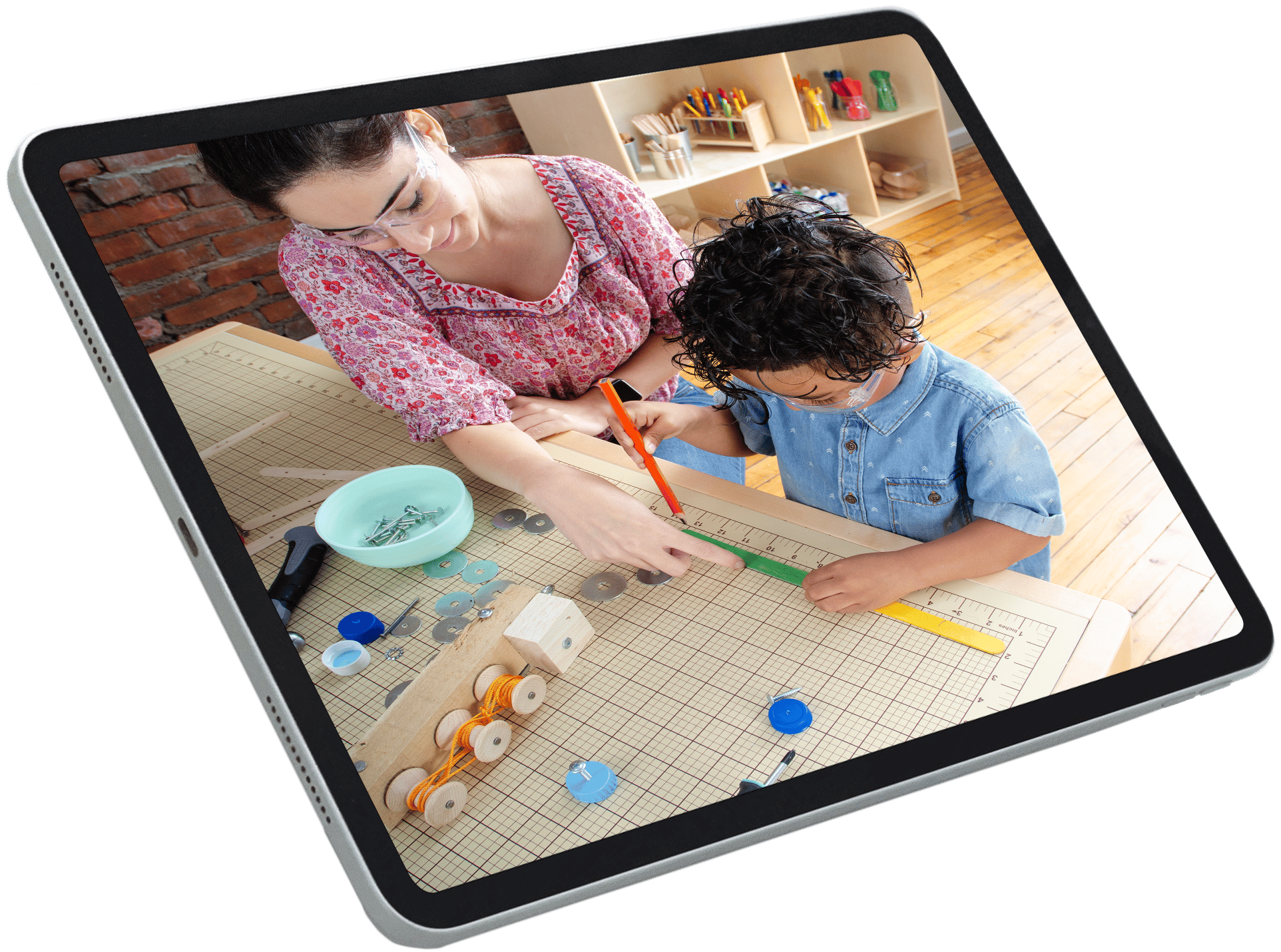
Naomi McQuiller is the 2018 NAEYC Lasting Legacy Scholar and the Hal Kaplan Scholarship Recipient. As a scholar, Naomi had the opportunity to attend the 2018 NAEYC Annual Conference. During her time at the conference, Naomi enjoyed building meaningful relationships, exploring new products and resources, and learning how to apply research-based tools and strategies in the classroom. Learn more about Naomi's experience and what she learned as a Hal Kaplan Scholarship Recipient in this behind-the-scenes interview.
1) What were your top four takeaways from the NAEYC Annual Conference?
- Give Love
- Share Your Bright Ideas
- Build Meaningful Relationships
- Know Your Worth

2) In your application, you discussed your passion for culturally responsive instruction, especially in regards to literacy. Can you explain to our readers what culturally responsive instruction is and why it's important? How did you further your knowledge of this subject at NAEYC?
When a teacher practices culturally relevant teaching, they are instructing students in a way that engages them in multiple domains (social, emotional, academic) through the lens of their personal culture. Culture can be described in a variety of ways - race, religion, hometown or country of origin, or even what their family does on the weekends. Each student brings their culture, as well as various Funds of Knowledge (cultural expertise), into the classroom. After getting to know their students, as well as their families, teachers are able create meaningful learning experiences that make standards accessible for all children. This method of instruction also teaches young children that everyone has something valuable that they can bring into the classroom, and that everyone's voice matters. During the NAEYC Annual Conference, I was able to attend multiple sessions that covered topics such as leading discussions on culture and race in the classroom and working with families of English language learners. The most valuable part of my experience was being able to connect with educators from other states and countries. I had the wonderful opportunity to hear about their experiences working with students from diverse backgrounds, and we were able to swap and share ideas.
3) You stopped by the Kaplan booth at NAEYC and were able to talk with several Kaplan team members. What was that experience like? What did you enjoy most about the Kaplan booth?
It was incredible to meet some of the representatives from Kaplan! I was able to discuss my experience throughout the week, which helped me make connections between the scholarship and the conference experience. I really enjoyed the nature/outdoor displays and materials! As I was browsing, the team members were able to give me tips on how to effectively use them in the classroom, as well as ways to teach little ones how to use and explore the materials in a meaningful way!
4) As an emerging leader in early childhood education, what issues or obstacles do you think your generation of teachers face?
There are many incredible online resources that are available to teachers today. The most popular of these are TeachersPayTeachers and Pinterest. While these can be great for finding ideas and resources to create lessons, many times teachers end up pulling straight from a website without ensuring that the activities chosen are 1) developmentally appropriate, 2) related to a standard, and 3) meaningful to the student. Teachers can sometimes get caught up in the "cuteness" of an activity, and try to match it with a standard later on.
5) How do you think you and your peers will influence early childhood education as you grow as both teachers and leaders?
My hope is that my peers and I will be able to create a community of educators who advocate for both students and the profession. Early Childhood educators are natural helpers and caretakers. We often have no problem caring and advocating for those we love - in this case our students and their family. However, we must also advocate for ourselves and our fellow teachers. In the future, I want to give other educators the resources to be a powerful force in our field. !

What Is the Hal Kaplan Emerging Leader Scholarship?
Kaplan recognizes that elevating the field of early childhood education is dependent on the ambition and cooperation with diverse, new voices in our industry, and sees support of these rising stars as a promise to future generations of young learners. This scholarship is offered to emerging leaders in the field of early childhood education with fewer than 2 years of experience in a management position and from a historically under-represented population.LEARN MORE
CLICK HERE to Apply for the Hal Kaplan Emerging Leader Scholarship Today!
Applicants must complete and submit the online scholarship application and recommendation form by March 15, 2019, at 11:59 PM (ET). Applications that are incomplete or late will not be considered. Speakers, presenters, and vendors attending the conference are not eligible to apply. Applicants are encouraged to request their recommendation from a supervisor or professional colleague as soon as possible to allow sufficient time for the recommendation to be completed and submitted. The recommendation must be received by the deadline to complete the application.
